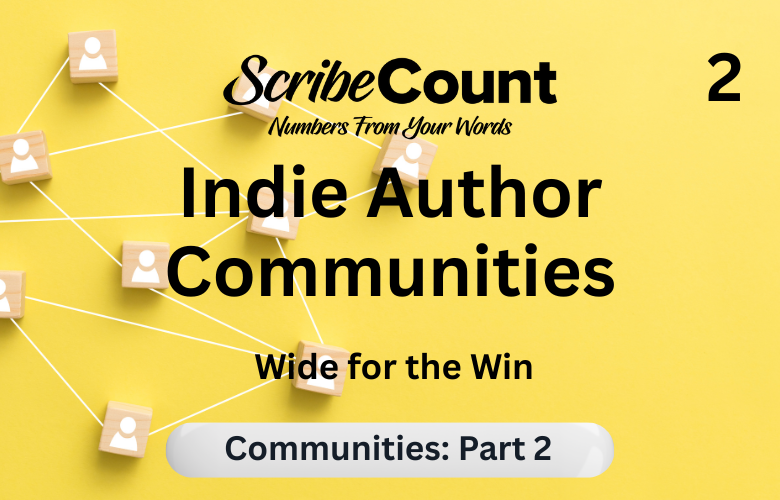Wide for the Win. The Spark That Ignited a Movement
In late 2019, Idaho-based romance novelist Erin Wright grew frustrated by how many authors felt locked into Kindle Unlimited. Alongside her long-time writing ally Suzie O’Connell, she opened a Facebook enclave called Wide for the Win. The goal was simple: carve out a safe, expertly moderated place where indie and hybrid writers could learn to “go wide”—publishing ebooks, audio, and print across every viable storefront instead of remaining exclusive to Amazon. What began as an informal chat now exceeds 20,000 members and counting—a testament to the hunger for knowledge beyond exclusivity.
Leadership and Moderation Philosophy
Wright serves as primary administrator, flanked by co-founder O’Connell and an extended volunteer team that includes author and industry veteran Mark Leslie Lefebvre, author DeAnna Hart, and author Bradley Charbonneau. Their combined expertise shapes a culture that balances generous mentorship with firm boundaries. New joiners are greeted personally, reminded of the mission—kindness, craft, and business acumen—and issued an invitation to “pay knowledge forward” as soon as they can.
"Bank before Rank!"
This is the popular saying at Wide for the Win. This is a slightly jaded mantra that means prioritizing actual income (the "bank") over chasing fleeting bestseller rankings (the "rank"). Discussions at WftW are focused on this mindset and it has proven to be a good principle to follow. In essence, "Bank before Rank" is about being a sensible, financially stable author who knows that dinner party conversation about being a "top 100 author" won't put food on the table. It's about building a sustainable writing career, not just a flashy but ultimately empty title.
House Rules That Keep the Dialogue Golden
Rule one is courtesy: no personal attacks, snark, or condescension. Rule two forbids link-dropping or promo unless it directly answers a question and offers value to the thread. Rule three bans KU discussions or exclusivity-bashing unless it pertains to moving from KU to wide; the group’s ethos is education, not tribal warfare. Rule four is that all advice be rooted in real-world data whenever possible—screenshots of wide dashboards, ad reports, or retailer emails rather than hearsay. (ScribeCount sunbursts charts are very popular) Finally, spoilers for retailer algorithms or confidential beta tools are removed to protect both authors and platforms.
A Timeline of Expansion
From its first hundred members in January 2020, Wide for the Win crossed 5,000 by the launch of Wright’s companion book Wide for the Win in March 2021. When Draft2Digital merged with Smashwords in 2022, lively threads pushed membership past 12,000 in a single quarter. By mid-2025, sustained growth and monthly live Q&A sessions have propelled the community beyond 18,000 engaged authors. The group now maintains a dedicated website, podcast, and Facebook group.
The Conversations That Matter
While there is no rigid schedule for topics an average day at WftW will have authors dissecting everything from fresh data from Kobo Plus, Google Play pre-orders, to Spotify-Findaway contract changes. A typical Tuesday might feature a real-time case study: an author whose direct-store launch via Payhip doubled her BookBub ROI. Wednesdays might have someone showcasing a “Metadata Makeover,” they did where blurb experts volunteered to refine BISAC codes. Weekend marathons can range from such topics as expanding translations through StreetLib, bundling series omnibuses for libraries, or harvesting paperback sales through local indie stores. No topic, other than KU, is turned away.
Success Stories Fueling the Fire
One hallmark are the Celebration Threads where members share victories ranging from “first 10 sales on Apple Books” to “crossed $100,000 lifetime revenue outside Amazon.” Erin personally replies with tailored next steps, reinforcing a success-begets-success loop. The ripple effect: newcomers see proof that wide isn’t a hobbyist cul-de-sac but a scalable career path.
Popular Subjects Dominating 2025
— The post-merger Draft2Digital-Smashwords storefront alignment and how coupon codes increase sell-through.
— Spotify’s integration of AI-narrated audio and what it portends for wide audio reach.
— Kobo Plus expansion into the U.S. and UK, complete with pilot subscription tactics.
— Direct-store ecosystems using BookFunnel delivery and PayPal integration for VAT compliance.
— Universal Book Links versus Geniuslink for cross-retailer analytics.
Evidence of Impact
Internal polls reveal that 74 percent of active members published at least one title wide within six months of joining the group. Meanwhile, platform analytics shared by authors show an average 38 percent year-on-year growth in non-Amazon revenue after implementing community-tested strategies.
Why Wide for the Win Works
The recipe blends three ingredients. First is group transparency—members disclose their income splits, ad spend, and mistakes, lowering the barrier to trust. Second, the community leans toward real-name profiles, thus deterring trolls. Third, curated learning paths—newbies start with a pinned “Wide 101” guide and a "Tree of Knowledge" containing evergreen content on a variety of subjects. There are also several sub-groups pertaining to items such as Direct Sales or Marketing. The result is a living mastermind that morphs with publishing’s fast pace yet never loses its inclusive soul.
Links for Deeper Engagement
Community website: https://wideforthewin.com
Facebook hub: https://www.facebook.com/groups/wideforthewin
A Balanced Appraisal
After six years and tens of thousands of posts, Wide for the Win has matured from scrappy support group to industry thought leader. Its moderators answer questions days before many aggregators update FAQs. Members leave empowered, not overwhelmed, armed with spreadsheets, launch checklists, and the confidence that their global readership is within reach. For any author who dreams bigger than a single storefront, Wide for the Win isn’t just helpful; it is indispensable.
